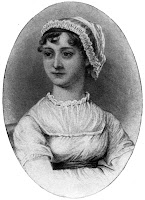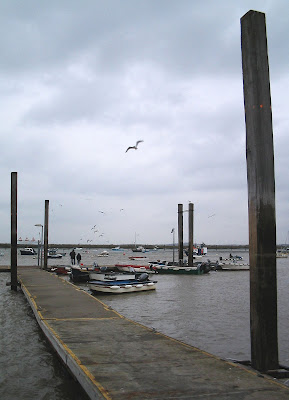
Apropos Rob's comment on Peter and Jane and Me, here's the link to Wendy Cope's poem, 'Reading Scheme'.





 A quick surf around some of my regular blog-haunts over the past couple of days has revealed a tidal wave of agreement with O'Brien's arguments and general approval for The Guardian's publication (as from tomorrow) of a series of giveaway booklets on 'Great Poets of the 20th Century', including works by TS Eliot, Philip Larkin and Sylvia Plath, accompanied by a CD of the poets reading their work.
A quick surf around some of my regular blog-haunts over the past couple of days has revealed a tidal wave of agreement with O'Brien's arguments and general approval for The Guardian's publication (as from tomorrow) of a series of giveaway booklets on 'Great Poets of the 20th Century', including works by TS Eliot, Philip Larkin and Sylvia Plath, accompanied by a CD of the poets reading their work.










 Here's a curiosity from my chaotic bookshelves which might amuse. Less Eminent Victorians by 'R. D.' (Randolph Davies), published in 1927, pokes fun at the Victorian era in a series of limericks, based around wood engravings from popular periodicals of the time - The Leisure Hour and The Quiver among them., and also from a book called Mary Price: The Memoirs of a Servant Maid.
Here's a curiosity from my chaotic bookshelves which might amuse. Less Eminent Victorians by 'R. D.' (Randolph Davies), published in 1927, pokes fun at the Victorian era in a series of limericks, based around wood engravings from popular periodicals of the time - The Leisure Hour and The Quiver among them., and also from a book called Mary Price: The Memoirs of a Servant Maid.


 Should it happen to be your birthday today, you share it with one of my favourite poets – Emily Dickinson , born 10 December 1830.
Should it happen to be your birthday today, you share it with one of my favourite poets – Emily Dickinson , born 10 December 1830. I’ve known some of Dickinson’s poems for years, but have only recently worked my way through the Complete Works - in fact, I haven’t quite finished yet. (As an Eng. Lit. girl, I'm probably a bit of a late-starter in this respect, to say the least.)
I’ve known some of Dickinson’s poems for years, but have only recently worked my way through the Complete Works - in fact, I haven’t quite finished yet. (As an Eng. Lit. girl, I'm probably a bit of a late-starter in this respect, to say the least.) I’ve found so much in her work that is exquisitely evocative and moving and personal. For anyone who’s a bit ‘scared’ of poetry, one of the best things about her work is that Emily Dickinson is often regarded as ‘coming from nowhere’. She doesn’t belong to any school or tradition of poetry, she simply ‘appeared’. And I wonder whether this doesn’t explain in large measure why her poems – 150 years old – seem so fresh and accessible and have gained her such a huge following. Her poems are completely timeless, it seems to me. Many of them could have been written yesterday. And when you see her handwritten versions, with their incomplete rhymes and unconventional punctuation (she was a great user of dashes and odd capitalisation) – they seem so spontaneous and full of life.
I’ve found so much in her work that is exquisitely evocative and moving and personal. For anyone who’s a bit ‘scared’ of poetry, one of the best things about her work is that Emily Dickinson is often regarded as ‘coming from nowhere’. She doesn’t belong to any school or tradition of poetry, she simply ‘appeared’. And I wonder whether this doesn’t explain in large measure why her poems – 150 years old – seem so fresh and accessible and have gained her such a huge following. Her poems are completely timeless, it seems to me. Many of them could have been written yesterday. And when you see her handwritten versions, with their incomplete rhymes and unconventional punctuation (she was a great user of dashes and odd capitalisation) – they seem so spontaneous and full of life. And yet, she was for the greater part of her life a recluse – the ‘Woman in White’ – who shied away from company and even from leaving the house at all.
And yet, she was for the greater part of her life a recluse – the ‘Woman in White’ – who shied away from company and even from leaving the house at all.



 Compare the photo above with the similar view taken on the day of the surge tide. In the distance is Mersea's historic Oyster Packing Shed.
Compare the photo above with the similar view taken on the day of the surge tide. In the distance is Mersea's historic Oyster Packing Shed.



 This very poor photo was taken at dusk - 4.40 pm - with my unsophisticated little snappy camera. I'm only including it here because it shows the largest number of Brent geese I've seen at this end of the Muddy Island so far this year. As regular readers of Musings will know, I've got rather a thing about these birds. The noise was tremendous. I took some more snaps as they flew overhead, but those were even worse than this one (can this be possible? unfortunately, yes).
This very poor photo was taken at dusk - 4.40 pm - with my unsophisticated little snappy camera. I'm only including it here because it shows the largest number of Brent geese I've seen at this end of the Muddy Island so far this year. As regular readers of Musings will know, I've got rather a thing about these birds. The noise was tremendous. I took some more snaps as they flew overhead, but those were even worse than this one (can this be possible? unfortunately, yes).







